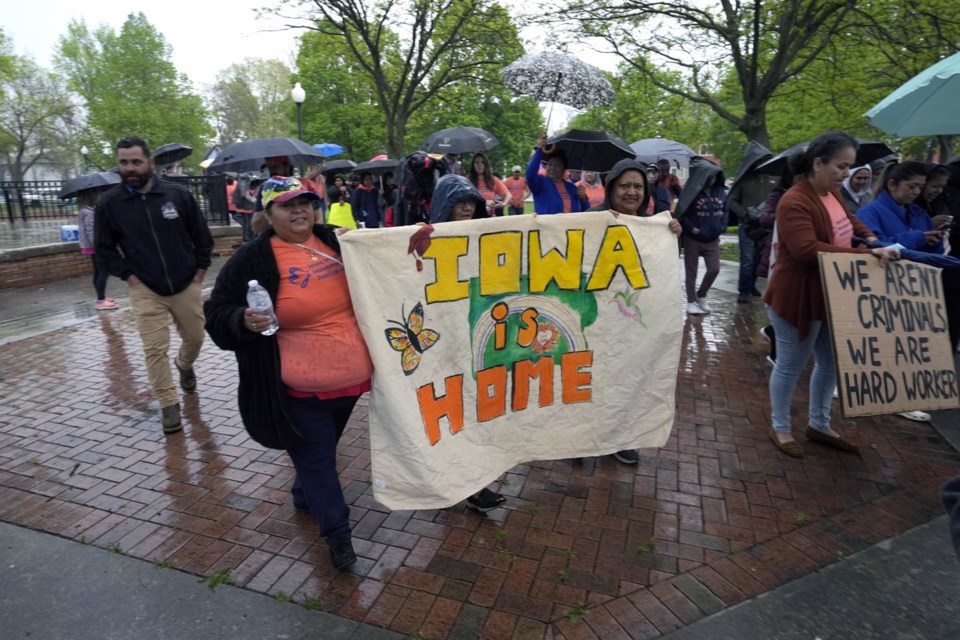DES MOINES, Iowa (AP) — A federal judge on Monday temporarily blocked an Iowa law that would have allowed law enforcement in the state to file criminal charges against people with outstanding deportation orders or who previously had been denied entry to the U.S.
U.S. District Court Judge Stephen Locher issued a preliminary injunction because he said the U.S. Department of Justice and civil rights groups who filed suit against the state were likely to succeed in their argument that federal immigration law preempted the law approved this spring by Iowa lawmakers. He stopped enforcement of the law “pending further proceedings.”
“As a matter of politics, the new legislation might be defensible,” Locher wrote in his decision. “As a matter of constitutional law, it is not.”
The Iowa law, which was set to take effect July 1, would let law enforcement file charges to be brought against people who have outstanding deportation orders or who previously have been removed from or denied admission to the U.S. Once in custody, migrants could either agree to a judge’s order to leave the U.S. or be prosecuted, potentially facing time in prison before deportation.
In approving the law, Iowa’s Republican-majority Legislature and Republican Gov. Kim Reynolds said they took the action because the administration of Democratic President Joe Biden wasn’t effective in controlling immigration along the nation’s southern border.
In arguments last week before Locher, the state said the Iowa law would only enable state law enforcement and courts to apply federal law, not create new law. Federal authorities determine who violates U.S. immigration law, Patrick Valencia, Iowa’s deputy solicitor general, had argued, but once that is determined, the person also was in violation of state law.
“We have a law that adopts the federal standard,” Valencia said.
However, the federal government and civil rights groups said the Iowa law violated the federal government’s sole authority over immigration matters and would create a host of problems and confusion.
Christopher Eiswerth, a DOJ attorney, and Emma Winger, representing the American Immigration Council, said the new Iowa law didn’t make an exception for people who had once been deported but now were in the country legally, including those seeking asylum.
The law is similar but less expansive than a Texas law, which was in effect for only a few confusing hours in March before it was put on hold by a federal appeals court’s three-judge panel.
The Justice Department has also announced it would seek to stop a similar law in Oklahoma.
Iowa Attorney General Brenna Bird said in statement that she would appeal the judge’s decision.
“I am disappointed in today’s court decision that blocks Iowa from stopping illegal reentry and keeping our communities safe,” Bird said. “Since Biden refuses to secure our borders, he has left states with no choice but to do the job for him.”
Reynolds issued a statement that also expressed frustration at the judge’s ruling and criticized Biden.
“I signed this bill into law to protect Iowans and our communities from the results of this border crisis: rising crime, overdose deaths, and human trafficking,” Reynolds said.
Rita Bettis Austen, legal director of the ACLU of Iowa, one of the organizations that filed the lawsuit, praised the judge's decision, saying the law dumped a federal responsibility onto local law enforcement that wasn't prepared to take on the role.
Bettis Austen called the law “among the worst anti-immigrant legislation in Iowa’s history,” adding that it “exposed even lawful immigrants, and even children, to serious harms — arrest, detention, deportation, family separation, and incarceration, by the state.”
Scott Mcfetridge, The Associated Press


